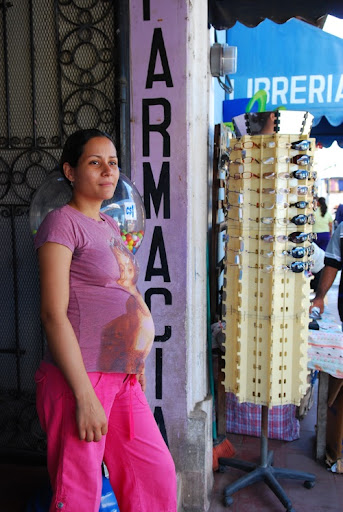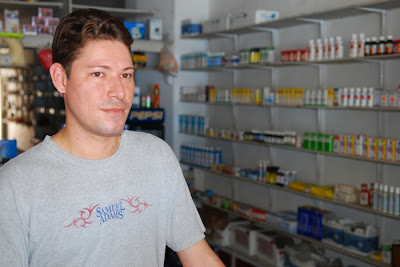There are people you meet who make you want to hit your head against a wall. I'm not talking about being angry or exasperated with someone; I'm talking about being exasperated with that darn thing called the language barrier. It's easier to accept being yelled at or insulted in a foreign language than it is to look into the eyes of someone as they speak to you--or you to them--and know that the words being exchanged are unintelligible to the other.
One morning in the Nicaraguan town of Granada I ducked out of the hot street and into the shade of a small pharmacy. Had shade been my sole purpose, I could have ducked into any number of shops. But I wanted something else, too: to ask the pregnant woman behind the counter if I could photograph her.
Her name, I would soon learn, was Angela. She was 26, and in two months she would give birth to her second child. One coworker was with her in the pharmacy this morning. His name was Eliazer, and he was 29 years old.

Angela spoke as much English as I did Spanish--less than 100 words--and so it was Eliazer, with his approximately 200-word vocabulary, who bore the weight of our struggling conversation. He was a patient and thoughtful translator. He also wasn't afraid to say “I don't know” when at a loss for how to translate something Angela said or to comprehend something I said. Not all translators are this honest.
On my own I had been able to convey to Angela that I would like to take her photograph--several photographs, actually--because I loved the shirt she was wearing over her pregnant belly.
I ended up taking about 20 pictures of Angela--by the gumball machine, by the shelves of medicine, close-ups of her hands resting atop her bulging belly. Many people can handle about five photographs before they start to get self-conscious and uncomfortable. Angela, however, took it all in stride. She was a natural, comfortable both with herself and with all the people on the street who were watching us.
The next day I returned to the pharmacy as I had promised, showing Angela and Eliazer the photographs I had downloaded to my laptop and asking them to select the ones they'd like copies of (I had also taken a couple of Eliazer). Eliazer presented me with a piece of orange cake he had picked up at a bakery, and Angela asked if I liked fish. When I returned to Granada, she said, I would join her family in their home for a fish dinner.
After I had closed the laptop the three of us continued talking. They asked questions of me--including queries into my marital status and what it is like traveling alone--and I asked questions of them.

There were several times when all three of us sat silently with pained looks on our faces, trying to find the words to communicate thoughts which, in the end, just couldn't make it over the language barrier. Angela especially, her hands on her belly, would sometimes just shake her head slowly, her eyes resigned to all we couldn't say. “Jo-el,” she would say, turning my name into a melodious two-syllable song that also served as a tender plea.
In my brief travels in Central America I'd been told by many people that I needed to learn more Spanish. But never had someone said it merely by saying my name.
Joel Carillet, chief editor of wanderingeducators.com, is a freelance writer and photographer based in Tennessee. He is the author of 30 Reasons to Travel: Photographs and Reflections from Southeast Asia. To learn more about him, visit www.joelcarillet.com.
